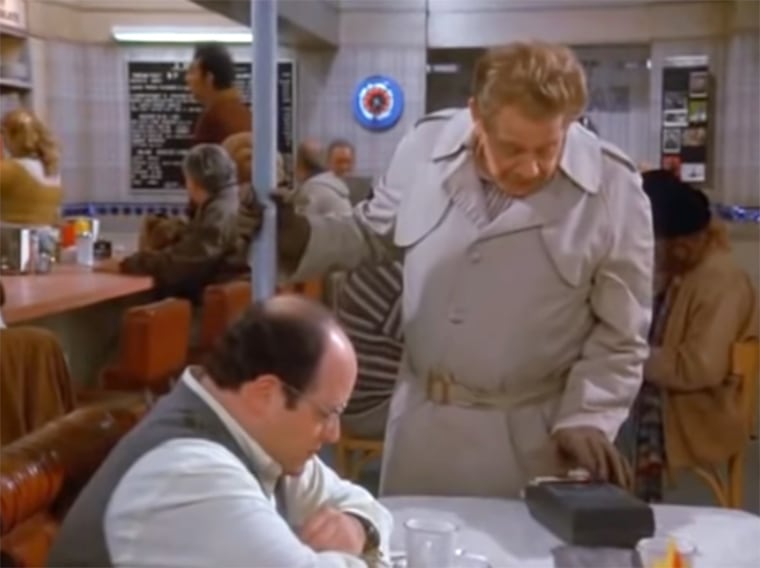Tradition: Across the world, families are coming together for holiday merriment and to practice the time-honored traditions that bind us all together. Fathers shall wrestle sons in the feats of strength, while mothers and daughters ensure that the food for the big dinner is prepared.
For, tonight, we shall gather our family around and tell them all the ways they have disappointed us over the past year. (Unfortunately, the table in my tiny New York City apartment only accommodates so many, so this column will have to suffice for our sharing in this tradition.)

Welcome, newcomers! The tradition of Festivus begins with the airing of grievances. I got a lot of problems with you people and now you're gonna hear about it.
First, we need to acknowledge the people who FaceTime and/or use their phones on speaker when in public. How, despite being wholly embedded in their valueless phone conversations, these inconsiderate masses manage to disprove Darwin’s theory of survival of the fittest by not wandering into oncoming traffic is beyond my expertise, but had the Founding Fathers known about these reprobates, they would have put an asterisk on the First Amendment in order to protect the country. Alas, we must suffer the indignity of their conversations that subtract from the sum total of human knowledge.
Then let us not forget the Emotional Support Peacock Lady, who also bravely helped to detract from the common good. Claiming disability, this woman sought to board a plane with a live peacock that she said was an “emotional support peacock.” It was a gross abuse of the rightful accommodations provided by the Americans with Disabilities Act and only harms the disabled themselves.
Earlier this month, Delta Airlines announced that it would restrict emotional support animals (which are not trained service dogs like Sully) on flights, including barring them on flights longer than eight hours. While that will likely be challenged in court, the people who abused these accommodations will make it harder for people with real challenges to be equal participants in society. Shame on them, and shame on Emotional Support Peacock Lady, who should be banned from flying (unless it is on the back of her peacock, which would truly make it a service animal).
Speaking of birds, there is the Mandarin Duck: Many people are flocking to New York’s Central Park to see this wondrous bird. When they gaze upon it, they see beauty. When I do, I see dinner. In fact, I’m of half a mind to get in touch with my hunter-gatherer roots and make this bird my Christmas dinner. New York has a mayor who murders groundhogs, after all, so a citizen like me picking off one small duck for a good meal is not out of order.
Sure, the Mandarin Duck’s fans would be shocked, but I’m disappointed in them in the first place for not recognizing this is a meal, not a tourist attraction. Instead of posting pictures on social media of it swimming in its pond, they should be sharing pics of a Mandarin Duck dish — they look best when roasted in their own fat — being served to excited diners.
But, broadly, whether social media is ultimately shown to play a positive or negative role in society remains to be seen; though the fact that they've spent years Hoovering up all our personal details to share and sell amongst themselves has certainly given many people pause already. However, it is indisputable that it is creating people who would give even Narcissus pause.
First, there are those who post on their Twitter profiles which prominent individuals have either followed or blocked them. Padma Lakshmi followed me on Twitter — a grave error in judgment on her part — but you didn’t see me bragging about it because who follows or blocks me on a social media platform does not add value to my life and nor should it to anybody else (unless it’s Mark Hamill, because, I mean, he’s Luke Skywalker).
Then, there are high-profile individuals who retweet even the faintest praise of their public prognostications. Are these individuals shallow? Quite possibly, but these actions make clear that we should all be questioning their priorities in life: That JoeShmoe46 from Dubuque with 19 followers really liked your book — if that isn't a fake profile or Twitter bot — shouldn't be news to anybody but JoeSchmoe46 and the 19 pornobots that follow him.
Then, we have the far more vainglorious Twitter users who are so desperate for attention that they retweet themselves, sometimes days after the tweet was originally posted, in the digital equivalent of standing on a busy street corner and shouting, “Look at me!” Sometimes, these people even take screenshots of their tweets and post them on Instagram or Facebook because they need to try and fill the emptiness inside themselves in as many ways as possible.
To them I say: Stop it. Stop it right now! You are this decade’s version of Paris Hilton, but somehow even less conscious of how self obsessed and shallow you are. Nothing on Twitter is that interesting, but especially not you.
More pressingly, it’s time that we hold a much-needed intervention with Silicon Valley CEOs, who are becoming the store-brand diet cola version of James Bond villains. Just look at Twitter’s Jack Dorsey and former chairman of Tesla, Elon Musk. The latter seems to have transformed himself into Lyle Lanley (the infamous "Simpsons" character who sold Springfield a monorail) while simultaneously self-destructing on a grand scale, like when he insinuated that one of the divers who rescued the Thai boys trapped in a cave earlier this year, was a pedophile (the diver sued Musk for defamation in September).
That and other bizarre behavior prompted the U.S. Securities and Exchange Commission to sue him and Tesla — a fight that resulted in Musk and Tesla each paying a $20 million fine, as well as Musk stepping down as chairman and then whining about regulation on Twitter like a half-hearted libertarian college activist forced to run the Snapchat account of the company where they’re begrudgingly interning. (This is what happens when you smoke weed and play with flamethrowers on a livestream of a podcast.)
Dorsey’s strange behavior is even more eyebrow-raising. At a time when his company is facing criticism for how it handles — or doesn’t — the harassment of users and rampant anti-Semitism, he followed in the footsteps of Gavin Belson (the villain in HBO’s series, "Silicon Valley") by going on a meditation retreat in Myanmar, where Facebook apparently helped the military commit ethnic cleansing. Meditating on the graves of the ethnically cleansed is somehow the path to enlightenment?!
But, before that, he apparently mailed part of his beard to the rapper Azealia Banks — not because she wanted a lock of his facial hair as a memento, but because Dorsey wanted her to use the hair to make an amulet that would protect him the terrorist organization ISIS, which pioneered the amplification strategy Russia later refined before the 2016 elections.
I've got no jokes for that one. Jack Dorsey wouldn't need an amulet if he'd just done something about abuse on his platform years ago instead of smoking weed and sending gross chin hair to a rapper more famous for her beefs than her beats.
And then, last week, The New York Times ran a somewhat controversial column that said the planet would be better off if all humans were killed off. The author would have presented a stronger case for human extinction if he had pointed to my targets of grievances. They’re all awful and, if you don’t agree, then so are you.
CORRECTION (Dec. 22, 2018 2:13 p.m. ET): An earlier version of this article misidentified the Simpsons' character who sold Springfield a monorail. It was Lyle Lanley, not Lionel Hutz. The error has put the writer on the editor’s list of grievances.






